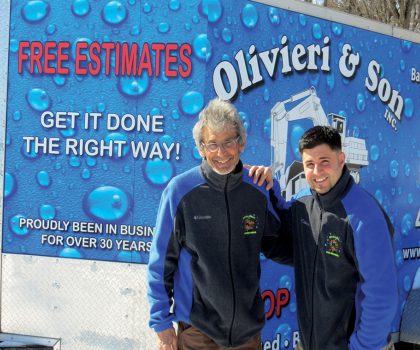Keeping the water out of your basement

By Randal Vanderhaven
The Old Farmer’s Almanac lists Cleveland among the eight worst winter cities in the U.S., and Northeast Ohio is on track for one of its wettest spring seasons ever. For many of us, that’s bad news.
But it can be even worse. Because all that snow has to go somewhere when it melts, and some of it could end up in your basement.
“There is a lot of pressure on your foundation at this time of year,” says Rocco Olivieri, co-owner of Olivieri & Son Basement Waterproofing.
“If your basement is going to leak, it’s probably going to leak now. A leaking basement can quickly ruin the foundation of your home.”
Since 1981, Rocco and his son, Mark, have waterproofed basements, rebuilt foundations, and inspected sewers.
“By using a camera inside your sewer, we can visually determine exactly what the problem is,” Rocco explains.
While water or moisture is the most obvious symptom of a compromised basement wall, a white residue or cracking in the walls also might signal a foundation problem that should be repaired, he adds.
If you do need to have your basement walls or foundation fixed, be careful of how it’s done, Rocco advises. Some companies try to minimize the problem from inside the basement. That isn’t the best way to do it, he insists.
“We work from the outside,” he says. “The key is to stop the water from penetrating your wall to begin with.”
If a repair is necessary, Rocco and Mark begin the process by excavating your leaky wall all the way to the footer. They then pressure wash your foundation to clean the debris and highlight any cracks where moisture may be entering. Those cracks are patched and sealed with Waterplug Sealant. For added protection, they coat the end wall from the footer to grade with Thoroseal Sealant.
“Rolling a tar rubber emulsion from footer to grade is the final step in preventing moisture from entering your wall,” Rocco says.
“For proper water drainage, we install four-inch heavy-duty perforated PVC along the footer. We will also provide a clean-out on each wall excavated, which provides easy access for camera jetting year round.”
The excavation is backfilled with premium wash gravel to direct water to the drain tile. The project is completed with a layer of topsoil—not dirt—to promote the growth of plants.
“Our process is probably stronger than the steps the original builder implemented,” Mark insists.
You can see for yourself how Olivieri and Son stop water from invading your home’s foundation by visiting their website, at BasementAndWaterproofing.com. To schedule your no-obligation estimate with Olivieri and Sons, you can call 440-342-6844.
